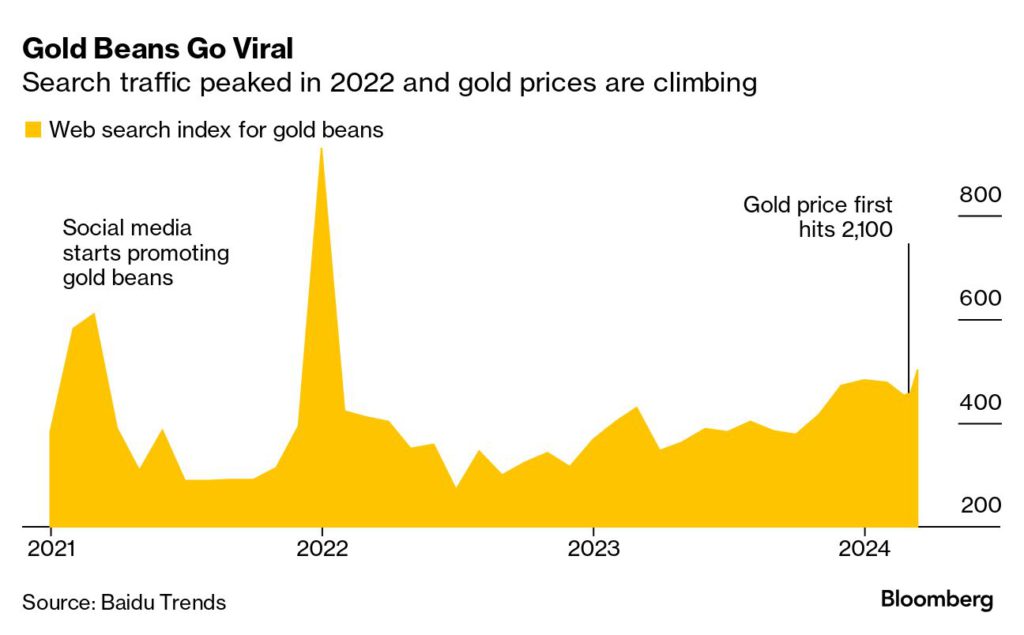Bloomberg News | March 17, 2024

(Reference image by Rob Corder, Flickr.)
With China’s deflation at its worst in 15 years, a volatile stock market and bank interest rates too low for her liking, 18-year-old Tina Hong is placing her financial security in gold beans.

Weighing as little as one gram, the beans — and other forms of gold jewelry — are increasingly viewed as the safest investment bet for young Chinese in an era of economic uncertainty. It’s part of a larger consumer trend for all things gold — from bullion to beans and bracelets — that has gripped the mainland.
“It’s basically impossible to lose money from buying gold,” reasoned Hong, a college freshman studying computer science in Fujian province who in January began buying gold beans because of their relatively low cost of about 600 yuan ($83) per gram. She has more than two grams of the beans and will continue buying them as long as costs are lower than international gold prices, she said.
Branded as an investment entry point for young consumers, the beans, which come in glass jars, are the latest hot-selling items in Chinese jewelry stores. Generation Z consumers — buffeted by high youth unemployment and the nation’s slide into deflation — are now among the top consumers of gold accessories in the world’s second-largest economy, according to the 2023 China Jewelry Consumer Trends Report by Chow Tai Fook Jewelery Group Ltd. The attraction of gold comes as people pull back on shopping amid months of disappointing growth.
China gold rush
A lack of faith in traditional investments has fueled this new China gold rush.
The nation’s stock market has seen declines after reopening from the pandemic, with one of its key benchmarks dropping to levels last seen in 2018. The country’s middle class is bearing the brunt of a property downturn — while the central bank has lowered a key interest rate four times since December 2021, eating into the return on wealth management products.

Young people are skipping “pleasurable consumption” and instead purchasing “asset-style jewelry” such as gold beans for adornment and investments, said Nikos Kavalis, managing director at the London-based consultancy Metals Focus Ltd.
However, he cautions that it makes no sense to invest in gold beans — or other gold items — because their price is often 10% to 30% higher than the commodity’s spot price. Investors would be better served by parking money in gold ETFs, he said.
Still, the fascination with gold is sweeping across social media. On Weibo, the Chinese equivalent of X, formerly Twitter, the hashtag “Why Are Young People Getting into Buying Gold” garnered 91 million hits. A lively discussion about the enduring value of gold dominates the social media site, with one popular post stating that “buying gold keeps troubles at bay.”
Three-quarters of gold consumers are now estimated to be between 25 and 35 years old and many believe investing in gold is low-risk, according to a 2021 report from the World Gold Council. That belief is reinforced as gold prices have hit multiple historic highs since December. Gold bullion passed the $2,100 per ounce threshold for the first time this month.
Sales of gold, silver and jewelery reached a six-year high in December, a 29.4% year-on-year jump, according to government data. Precious metals now represent one of the fastest-growing consumer markets in China.
Buying gold beans for gifting and investments also reached a peak during China’s lunar new year, says a spokesperson from Chinese jeweler Luk Fook Holdings International Ltd.
Even banks have joined traditional gold retailers to sell gold beans. China Merchants Bank Co., for example, introduced its line of gold bean sets in July 2023.
“Despite the recent surge in China’s gold price, consumers are still demonstrating a strong preference for gold,” said Cindy Yeung, chairwoman and managing director of Emperor Watch & Jewellery Ltd. Like other major jewelry retailers, Emperor is talking up gold on social media and e-commerce platforms.
Impure beans
There are perils for consumers of gold beans and other gold objects who aren’t knowledgeable about the difference between authentic gold and fakes, experts say.
Lily Chen, a 26-year-old Shanghai office worker, discovered almost all of the gold beans she had purchased were mixed with iron, zinc and copper when she recently tried to exchange them for a gold bracelet.
“I never tried cutting corners by buying gold at ultra-cheap prices, and I made sure to buy from star-rated web stores. But this could still happen,” she said.
Nonetheless, the craze for anything gold continues to play out on social media. College students are posting diary-like entries on gold purchases, couples share how they repaired strained relationships with gold gifts — and metal resellers and collectors offer gold investing advice.
No comments:
Post a Comment